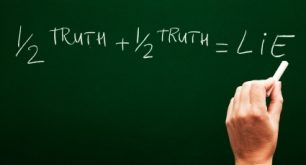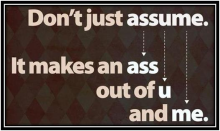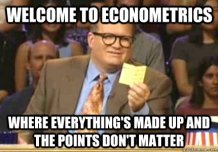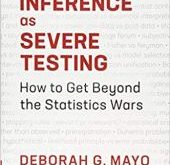On the validity of econometric inferences The impossibility of proper specification is true generally in regression analyses across the social sciences, whether we are looking at the factors affecting occupational status, voting behavior, etc. The problem is that as implied by the three conditions for regression analyses to yield accurate, unbiased estimates, you need to investigate a phenomenon that has underlying mathematical regularities – and, moreover,...
Read More »A different way to solve quadratic equations
A different way to solve quadratic equations .[embedded content] This one is for Linnea, my youngest daughter, who has now begun studying mathematics at my university ?
Read More »Statistical models and the assumptions on which they build
Statistical models and the assumptions on which they build Every method of statistical inference depends on a complex web of assumptions about how data were collected and analyzed, and how the analysis results were selected for presentation. The full set of assumptions is embodied in a statistical model that underpins the method … Many problems arise however because this statistical model often incorporates unrealistic or at best unjustified assumptions …...
Read More »Support Vector Machines (student stuff)
Support Vector Machines (student stuff) .[embedded content]
Read More »Avoiding statistical ‘dichotomania’
We are calling for a stop to the use of P values in the conventional, dichotomous way — to decide whether a result refutes or supports a scientific hypothesis … The rigid focus on statistical significance encourages researchers to choose data and methods that yield statistical significance for some desired (or simply publishable) result, or that yield statistical non-significance for an undesired result, such as potential side effects of drugs — thereby invalidating...
Read More »How to teach econometrics
How to teach econometrics One way to change the sad state of econometrics — an industry with a huge output but no sales — would perhaps be to follow Ed Leamer’s advice on how to teach it … To take my students on a journey toward real intelligence, I have given them the following assignment: Your boss walks into your office and says, “I read in the newspaper this morning that interest rates are going to increase this year. Is this right, and do I need to...
Read More »Causal inference — what the machine cannot learn
Causal inference — what the machine cannot learn .[embedded content] The central problem with the present ‘machine learning’ and ‘big data’ hype is that so many — falsely — think that they can get away with analyzing real-world phenomena without any (commitment to) theory. But — data never speaks for itself. Without a prior statistical set-up, there actually are no data at all to process. Clever data-mining tricks are not enough to answer important...
Read More »Econometric fundamentalism
The wide conviction of the superiority of the methods of the science has converted the econometric community largely to a group of fundamentalist guards of mathematical rigour. It is often the case that mathemical rigour is held as the dominant goal and the criterion for research topic choice as well as research evaluation, so much so that the relevance of the research to business cycles is reduced to empirical illustrations. To that extent, probabilistic formalization has...
Read More »Econometric FUQs
If you can’t devise an experiment that answers your question in a world where anything goes, then the odds of generating useful results with a modest budget and nonexperimental survey data seem pretty slim. The description of an ideal experiment also helps you formulate causal questions precisely. The mechanics of an ideal experiment highlight the forces you’d like to manipulate and the factors you’d like to hold constant. Research questions that cannot be answered by any...
Read More »Donald Rubin on the history of causal inference
Donald Rubin on the history of causal inference .[embedded content]
Read More » Heterodox
Heterodox






